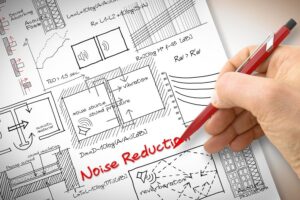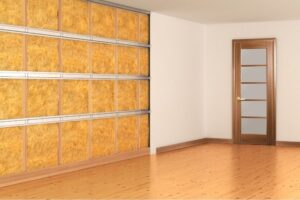Soundproofing your home has become an essential priority for numerous homeowners in today’s increasingly noisy world. As urban areas grow more populated and homes are constructed in closer proximity to one another, the frequency of noise disturbances has escalated. Modern construction often employs lighter materials, such as stud walls with gypsum board, which typically do not provide sufficient insulation against sound transmission. This has resulted in elevated noise levels that can disrupt daily activities, making it imperative for residents to explore effective soundproofing solutions to maintain a peaceful and serene atmosphere in their living spaces.
Homeowners yearn for a tranquil environment free from disturbances, minimizing conflicts related to noise complaints. Consequently, the demand for effective soundproofing solutions has surged dramatically. With the rising trend of remote work and the need for home entertainment, establishing a calm and quiet environment has never been more crucial. External noises, whether from bustling streets, nearby construction projects, or even boisterous neighbors, can profoundly affect one’s quality of life, which has led many individuals to consider soundproofing as a practical and beneficial option.
The annoyance of disruptive neighbors is often the primary reason many homeowners contemplate soundproofing their properties. The quest for a personal space insulated from unwanted noise has sparked a growing interest in soundproofing solutions across various dwelling types, especially in urban settings. Homeowners are determined to reclaim their peace and transform their homes into sanctuaries that protect them from the cacophony of the outside world.
Discover the Compelling Reasons to Invest in Home Soundproofing
- Elevate your home theater experience with optimized sound quality
- Cultivate a distraction-free environment for your home office
- Ensure serene sleeping conditions for infants and young children
- Diminish disturbances from street traffic or nearby train operations
- Alleviate noise pollution if situated near an aircraft flight path
- Assist shift workers in achieving restorative sleep
- Create an ideal acoustic environment for musicians and artists
Implementing effective soundproofing solutions can dramatically enhance your overall quality of life, resulting in a more harmonious living environment. Additionally, soundproofing can increase your home’s market value, making it a desirable feature for future buyers.
Beyond contributing to comfort, soundproofing also improves the overall energy efficiency of your home, facilitating consistent heating and cooling throughout your living space.
Explore the Multifaceted Benefits of Soundproofing
With effective soundproofing, you can relish in your favorite music or movies at any hour without causing disturbances to others in your household or neighborhood. This newfound freedom not only amplifies your enjoyment but also fosters a more peaceful coexistence with those around you, enhancing the overall quality of your living experience.
Furthermore, working from home can be extremely challenging if you are frequently disrupted by household noise. Soundproofing your home office can establish a focused work environment, enabling you to conduct conference calls or webinars without interruptions from family members or everyday household activities.
Maximize the Advantages of Soundproofing During Home Construction
The most efficient and cost-effective way to achieve a well-soundproofed room is by integrating soundproofing measures during your home’s initial construction phase or while undertaking an extension. By prioritizing soundproofing from the outset, you can prevent costly retrofitting in the future.
While constructing or renovating your home, ensure that superior soundproofing techniques and materials are incorporated into the design plans. Utilizing materials like acoustic plaster, soundproofing membranes, and mass elastic vinyl can significantly enhance your home’s ability to resist sound transmission, providing lasting benefits.
If you require a specifically soundproofed area, such as a recording studio, advanced planning is crucial to create a “room within a room” design. This strategy effectively isolates sound and prevents external noise from interfering with your audio projects, ensuring optimal recording conditions.
Understanding Noise: A Fundamental Element of Effective Soundproofing
Noise originates from sound waves, which can be characterized as energy waves traveling through various mediums. It is vital to understand that sound can be divided into two primary categories: airborne sound and impact sound.
Differentiate Between Airborne and Impact Sound for Effective Soundproofing Solutions
Airborne sound encompasses noise that travels through the air, including everyday sounds such as conversations, television noise, traffic, household appliances, music, and even dogs barking. Recognizing the characteristics of this type of noise is vital for implementing suitable soundproofing methods.
Conversely, impact sound is produced when objects physically contact surfaces within your home. Examples include the sounds of closing doors, moving furniture, and footsteps on hard flooring. To effectively mitigate these sounds, appropriate soundproofing strategies must be employed to manage sound wave transmission effectively.
To successfully reduce or halt sound transmission, it is crucial to diminish the energy or intensity of the sound waves. This can be accomplished through various soundproofing techniques and materials tailored to your specific requirements.
In-Depth Examination of Essential Soundproofing Techniques
Commence your soundproofing journey by meticulously inspecting your walls for any gaps or weak points. Employ acoustic sealant to seal any cracks or openings effectively. Treat soundproofing with the same level of importance as waterproofing; its effectiveness is only as strong as its weakest point, and attention to detail is crucial.
Consider the analogy of rolling down your car window and hearing loud external noises. If you roll it back up but leave a small gap, the noise persists; however, closing the window completely eliminates the sound. This principle holds true for soundproofing efforts in your home.
To enhance soundproofing, consider increasing the mass of your walls by incorporating high-mass or high-density products. This added mass significantly contributes to the wall’s ability to absorb sound energy and vibrations effectively. Without this enhancement, simply adding mass may yield minimal improvements.
Incorporating acoustical insulation between wooden battens in your walls can substantially reduce sound reverberation. This addition aids in absorbing sound waves and minimizing their transmission throughout your home, contributing to a quieter living environment.

Leverage a Variety of High-Mass Materials for Optimal Soundproofing Results
Different materials exhibit unique effectiveness at addressing specific sound frequencies. Therefore, utilizing a combination of high-mass materials will yield superior results compared to relying on multiple materials of the same type. Understanding the subtleties of soundproofing materials is essential for achieving success.
Blocking: To effectively obstruct sound waves from infiltrating a space, consider implementing double-glazed windows, sealing cracks and holes in walls, and utilizing door sweeps to prevent sound from penetrating beneath doors and around window frames. These measures create a solid barrier against unwanted noise.
Absorbing and damping are two closely connected concepts in soundproofing. Absorbing refers to materials that “soak up” sound vibrations, such as carpets, cork flooring, acoustic foam, or ceiling insulation. Damping, on the other hand, involves inhibiting the energy wave from vibrating and propagating further; for instance, a solid wood door is more effective than a particleboard door in this regard.
Decoupling: This technique involves separating two sides of a structure to prevent direct contact, thereby minimizing the transfer of vibrations from one side to the other. It is highly effective for isolating sound on one side of a wall and preventing it from traveling through to the other side, providing a quieter environment.
Consider which rooms in your home require soundproofing. Any space you believe would benefit from reduced noise levels is an ideal candidate for soundproofing interventions.
If you are in the process of building or renovating, integrating additional soundproofing products will significantly enhance your living experience. A home that successfully blocks outside noise and has been acoustically treated offers a more comfortable atmosphere for all occupants.
Proven Strategies for Soundproofing a Recording Studio
If your objective is to create a professional recording studio or sound booth, the most effective method involves constructing a “room within a room.”
This design ensures that the interior room remains physically disconnected from the external environment, which is the essence of decoupling. By preventing sound vibrations from traversing through walls, you can achieve optimal sound isolation, allowing for high-quality recordings.
Both the inner and outer rooms should be constructed using dense materials such as acoustic plasterboard, complemented by acoustic insulation or foam between the walls. Additionally, sealing the room with acoustic sealant is essential to eliminate any gaps around the door frame, effectively blocking unwanted noise and external sounds.
When soundproofing a home theatre room, effective measures can be implemented using acoustic gypsum board and noise-resilient mounting clips. These components work cohesively to create a robust sound barrier between the gypsum board and the stud framing, ensuring an immersive viewing experience.
To enhance sound absorption in your home theatre, consider incorporating high-quality carpets and upholstered furniture, which will help to reduce echoes and create a more immersive viewing atmosphere for your entertainment.
Achieve Maximum Focus with Effective Soundproofing in Your Home Office
When working from home, the last thing you need is unnecessary noise distracting you from your tasks. Loud neighbors, playful children, lawnmowers, or barking dogs can create substantial interruptions that may hinder your productivity and focus.
To create an effective soundproof home office, you can implement the same strategies used for soundproofing a home theatre. By employing high-quality soundproofing materials, you can establish an environment conducive to focused work and creativity, free from external distractions.
Transform Your Bedrooms into Tranquil Retreats with Soundproofing Techniques
A bedroom serves as a sanctuary where minimal noise is paramount for relaxation and restful sleep. The elimination of disturbances is key to ensuring a good night’s sleep, and significantly reducing outside noise can greatly enhance your sleep quality, leading to improved overall well-being.
For effective soundproofing in bedrooms, it is typically sufficient to install a medium-density acoustic insulation mat within the interior walls, complemented by a higher-density insulation mat in the exterior walls. Furthermore, utilizing a draft stopper or door sweep on the bedroom door can further diminish noise intrusion from outside.
Addressing Soundproofing Needs in Existing Rooms
Standard gypsum board walls often fail to provide adequate sound reduction due to their limited thickness. The space between the boards and the wall cavity can create an echo chamber, allowing sound waves to bounce around and penetrate through the wall studs, leading to increased noise levels.
Depending on your desired level of soundproofing and your available budget, we recommend the following strategies to effectively enhance sound insulation.
Option 1: Embrace Open Spaces with Soft Furnishings for Noise Reduction
To effectively minimize sound in a room or area, consider adopting an open-plan design. Use soft furnishings like upholstered furniture, area rugs, carpets, and blackout curtains or drapes. All these elements contribute to diminishing the transmission of sound waves, creating a more serene and enjoyable atmosphere.
Floor coverings play a crucial role in absorbing sound, while curtains effectively block noise from entering through windows, further enhancing your overall soundproofing efforts.
Option 2: Elevate Sound Absorption with Acoustic Treatments
If open space modifications are insufficient, you can significantly enhance soundproofing by adding sound-absorbing ceiling tiles and exterior acoustic tiles to walls. If carpeting is a consideration, utilizing an acoustic underlayment on the floor can dramatically improve sound insulation, particularly in apartments with neighbors below.
Option 3: Address External Noise Sources for Enhanced Peace
If external noise is a major concern, such as living near a busy street or having noisy neighbors, you may need to implement structural changes to your walls and doors. Consider adding a layer of acoustic plasterboard over existing walls and replacing hollow doors with solid-core doors for improved sound insulation.
Additionally, incorporating a draft stopper will help prevent noise from seeping under the door, further enhancing the soundproofing of your bedroom and creating a more tranquil space.
Option 4: Comprehensive Wall Insulation for Superior Soundproofing
The next effective step involves removing the current gypsum board, filling the wall cavity with acoustic wall insulation, and then re-plastering it with acoustic gypsum board. This comprehensive approach provides a robust sound barrier, significantly reducing noise transmission and creating a quieter living environment.
Option 5: Constructing Acoustic Walls for Maximum Sound Isolation
For the highest level of soundproofing, consider constructing an acoustic wall, similar to the construction methods used in professional recording studios. This process requires a contractor to frame a new wall detached from existing walls, ensuring that wall cavities are filled with appropriate insulation material and covered with acoustic gypsum board.
Moreover, incorporating mass elastic vinyl can further enhance sound insulation. Don’t forget to install quality carpeting and an acoustic underlayment on the floors to complete your soundproofing measures, resulting in a significantly quieter home.
Seek Professional Guidance for Tailored Soundproofing Solutions
For personalized advice on selecting the most effective soundproofing materials and techniques, reach out to professionals who can provide insight into your specific noise challenges. Discover expert recommendations for Brisbane soundproofing solutions that can dramatically transform your living environment into a peaceful retreat.
The Article Soundproofing Your Home was found on https://limitsofstrategy.com
The Article Soundproofing Your Home for Ultimate Peace and Quiet First Appeared ON
: https://ad4sc.com





Comments are closed